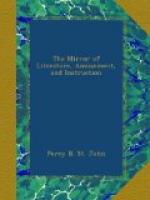If a criminal indicted of petit treason, or felony, refuseth to answer or to put himself upon a legal tryal, then for such standing mute and contumacy, he is presently to undergo that horrible punishment called Peine forte et dure; that is, to be sent back to the prison from whence he came, and there laid in some low, dark room, upon the bare ground, on his back, all naked, his arms and legs drawn with cords, fastened to the several corners of the room; then shall be laid upon his body, iron and stone, so much as he may bear, or more; the next day he shall have three morsels of barley bread without drink, and the third day shall have drink of the water next to the prison door, except it be running water, without bread; and this shall be his diet till he die. Which grievous kind of death some stout fellows have sometimes chosen, that so not being tryed and convicted of their crimes, their estates may not be forfeited to the king, but descend to their children, nor their blood stained.
Perjury, by bearing false witness upon oath, is punished with the pillory, called Callistrigium, burnt in the forehead with a P, his trees growing upon his ground to be rooted up, and his goods confiscated.
G.K.
* * * * *
PORTRAIT OF CHRIST.
(For the Mirror.)
The following extract is from a manuscript in the possession of the family of Kelly, now in Lord Kelly’s library, which was taken from the original letter of Publius Lentulus at Rome.
It being the usual custom of the Roman governors to advertise the senate and people of Rome of such material things as happened in their provinces, in the days of the Emperor Tiberius Caesar, Publius Lentulus, President of Judaea, wrote the following epistle to the senate, respecting Our Saviour Jesus Christ.
“There appeared in these our days, a man of great virtue, named Jesus Christ, who is yet living amongst us, and of the Gentiles he is accepted as a Prophet of Truth; but his disciples call him the Son of God. He raiseth the dead, and cureth all manner of diseases: a man of stature somewhat tall and comely, with very reverend countenance, such as beholders may both love and fear: his hair is of the colour of the chestnut, full ripe, plain to his ears, whence downward it is more orient, curling and waving about his shoulders; in the middle of his head is a seam or partition of his hair, after the manner of the Nazarites; his face without spot or wrinkles, beautified with a living red; his nose and mouth so formed as nothing can be represented; his beard thickish, in colour like his hair, not very long, but forked; his look innocent and mature; his eyes grey, clear, and quick. In reproving he is terrible; in admonishing, courteous and fair spoken—pleasant in conversation, mixed with gravity. It cannot be recollected that any have seen him laugh, but many have seen him weep. In proportion of body most excellent; his hands and arms most delectable to behold; in speaking, very temperate, modest, and wise. A man for his singular beauty far surpassing the children of men.”




